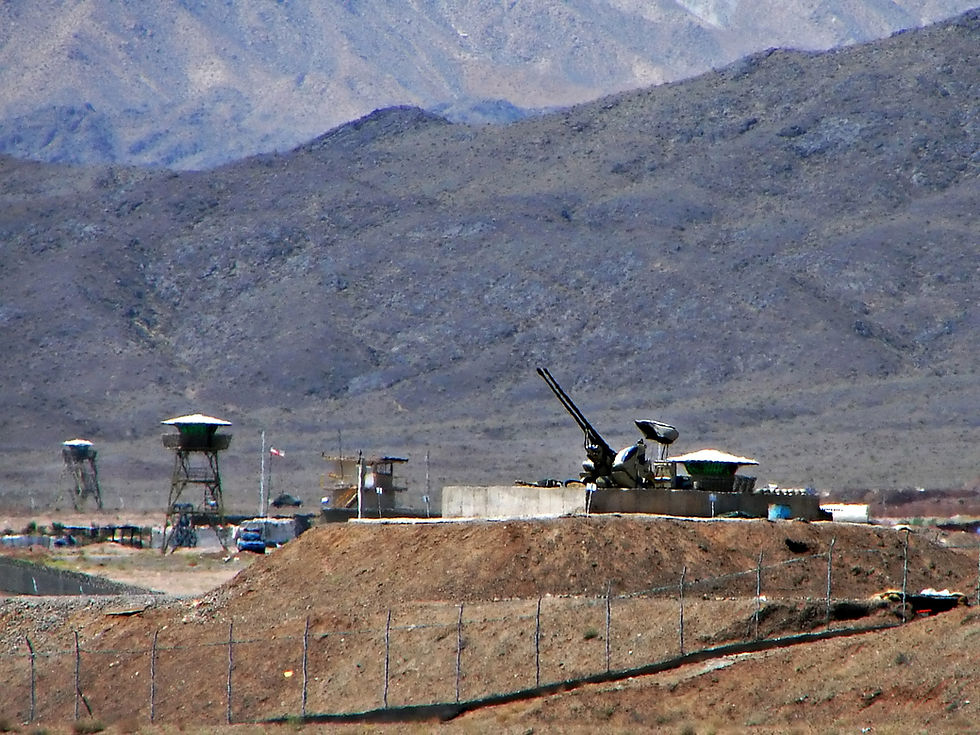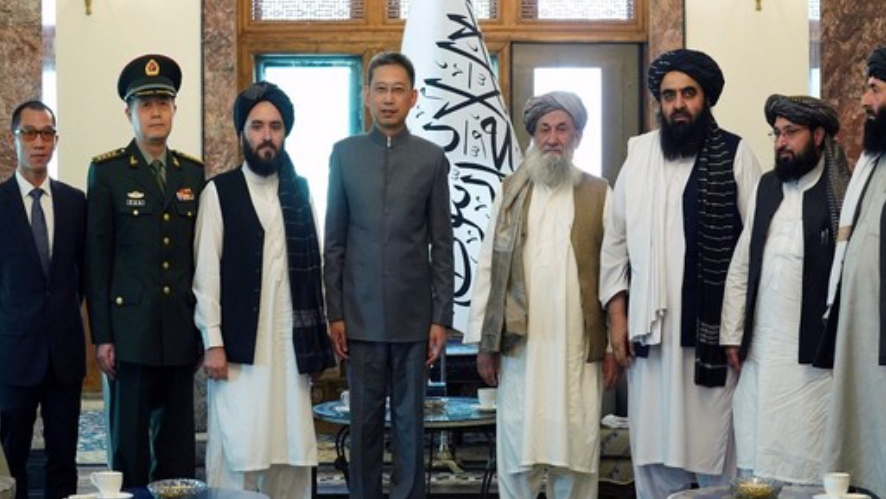Iran’s Nuclear Ambitions: Approaching the Nuclear Threshold and its Global Repercussions
- SIS Blog

- Sep 26, 2024
- 6 min read

By Debashreeta Behera
For an extended period, Iran’s nuclear aspirations have been under intense international scrutiny and diplomatic negotiation. But as it inches closer to the nuclear threshold, there have been heightened global concerns about its implications for regional stability in the Middle East and international security. The recent confidential report from the UN’s nuclear watchdog states that Iran has increased its uranium stockpile enriched to near weapon-grade levels not complying with international restrictions, a reality much closer now
Iran’s supreme leader recently expressed his intentions to renew negotiations with the United States concerning Iran’s rapidly advancing nuclear program. Ensuring its civilians that there is no harm in involving with Iran’s enemy, suggests a mocking undertone towards the United States' weakening efforts at limiting Iran’s nuclear program.
Iran's civilian nuclear program began in the 1950s under the Eisenhower administration’s Atoms for Peace initiative, with U.S. support in setting up nuclear research reactors in Tehran. Iran committed to peaceful nuclear exploration, becoming one of the 51 nations to sign the Non-Proliferation Treaty (NPT), pledging not to pursue nuclear weapons. However, the late 1970s brought U.S. concerns over Iran's nuclear ambitions following the establishment of the Atomic Energy Organization of Iran. Relations further deteriorated after the 1979 Islamic Revolution, which severed ties between Iran and the U.S., leading to the U.S.-backed Iraq-Iran war (1980-1988).
During this period, Abdul Qadeer Khan, the architect of Pakistan’s nuclear weapons program, possibly sold uranium enrichment technology to Iran. In 1995, Iran and Russia signed a contract to build light-water reactors at the Bushehr complex which was completed in 2010. Several intelligence reports about rising suspicion of Iran building a nuclear weapon prompted the U.S. to limit Iran's nuclear capabilities, including sanctions against foreign companies investing in Iran under the guise of combating international terrorism. Iran, meanwhile, in 1999 under President Mohammad Khatami’s détente policy advocated for a Middle East free of nuclear weapons, particularly concerned by Israel’s nuclear capabilities.
In 2002, the discovery of the Natanz uranium enrichment facility led to global suspicion of Iran’s pursuit of weapons of mass destruction (WMDs). Under international pressure, Iran temporarily suspended its nuclear program and allowed stricter inspections, but resumed its activities despite warnings from the UN Security Council asserting its right to use nuclear technology to produce fuel stating its motives as peaceful. The U.S. and Israel launched cyberattacks, including the infamous Stuxnet virus, delaying Iran's nuclear progress.
The 2015 Joint Comprehensive Plan of Action (JCPOA) imposed strict limits on Iran's nuclear program in exchange for sanctions relief. However, after the U.S. withdrew from the deal in 2018 under the Trump administration, Iran resumed uranium enrichment. In response to growing isolation, Iran strengthened ties with Russia and China by virtue of their common shared interests and increased its support for militias across the region, escalating its covert conflict with Israel.

Regional Security Implications
Saudi Arabia opposes Iran's nuclear program as it sees it as a direct threat to its security and influence in the Middle East. The JCPOA, which eased sanctions on Iran, was perceived by Saudi Arabia as empowering Iran economically and politically, increasing its regional dominance, while excluding Saudi and its allies from key negotiations. Additionally, Saudi concerns over Iran’s growing asymmetric power, supported by its oil revenues, drive this opposition. The GCC countries have also been proactive in negating the growing power of Iran in the region by engaging with external powers such as the US and NATO and having normalized relations with Israel, a shared adversary of Iran.
Similarly, Israel’s nuclear opacity policy threatens Iran's security and regional ambitions. Israel views a nuclear Iran as an existential threat as Iran has been historically hostile to Israel over its legitimacy and criticizing its policies towards Palestine further deepening the rivalry over nuclear power.
Iran's nuclear ambitions may bolster its confidence in supporting regional proxy groups, including Hezbollah, the Assad regime, Shiite militias in Iraq, and the Houthis, thus extending its strategic influence and further destabilizing the Middle East. This expanded backing not only threatens the interests of regional adversaries like Saudi Arabia and Israel but also deepens sectarian divisions and heightens geopolitical tensions across the region.
Global Security and Non-Proliferation
The 2015 Joint Comprehensive Plan of Action represented a significant diplomatic achievement aiming to restrict Iran’s nuclear activities in exchange for relief from crippling sanctions and ensuring Iran’s compliance with international inspections. The US withdrawal from the deal in 2018 led to the agreement’s partial disintegration prompting Iran to exceed the limits mentioned in the JCPOA. Efforts are being carried out to revive the deal amidst the rising challenges of growing Iran’s powers and shifting regional geopolitics.
Despite being a signatory of the Non-Proliferation Treaty, Iran’s pursuit of nuclear capabilities has drawn a vague line between the civilian and military use of nuclear technology. This could encourage other Middle Eastern states like Saudi Arabia or Turkey to follow suit, leading to a regional arms race and weakening global non-proliferation efforts. This can also likely lead to a shift in international power balances, especially in the Middle East. With Iran as a potential nuclear state, five of the nuclear countries in Asia (North Korea, China, India, Pakistan, and Iran(potential power)will be connected by land route forming a chain structure (except for Israel which is not connected through land route nevertheless apparently is a part of this chained structure), further elevating the probability of a nuclear war in the Asian continent in the future with the already omnipresent dilemmas and risks regarding nuclear weapon deployment associated with India-Pakistan, East Asia, and South East Asian rising tensions.
There remains a significant risk that there could be nuclear proliferation to non-state actors like Hezbollah as Iran has a long history of supporting non-state actors. A nuclear-armed Iran could potentially be influenced by leadership driven by ideological or unconventional motivations, raising concerns about their ability to fully consider the consequences of using nuclear weapons. They may also lack sophisticated security measures and command and control procedures, making their arsenals more vulnerable to theft or unauthorized access. Some scholars fear new nuclear powers might threaten nuclear use for blackmailing other nations or at best may lead to cascading nuclear proliferation in the Middle East.
The Strait of Hormuz has become one of the most vulnerable maritime and trade chokepoints, the blockade by Iran could lead to a full-blown war between Iran and the United States over gulf security and oil trade. This has been interpreted to usher over a global stock market crash.
Theoretical Dimensions
The challenges surrounding this issue are numerous and scholars have made significant efforts to address and mitigate them. According to Kenneth Waltz, Powers beg to be balanced. Israel is the only nuclear-armed power in the Middle East region and this nuclear monopoly has created instability in the region for decades now. In no other region of the world does a lone unchecked nuclear state exist. (Waltz, K. N. (2012). Therefore, it is only fair for Iran to stabilize the region by acquiring a nuclear deterrent. This would not only paradoxically balance the power in the region but also reduce Iran’s insecurity. Waltz saw nuclear deterrent as the ultimate security guarantee. He also believed that the slow spread of nuclear weapons could even be beneficial to deter conflicts and wars by citing the example of the escalation of mutual fear during the Cold War and the dampened scope of wars between India and Pakistan.
Conclusion
Iran's pursuit of nuclear capabilities poses significant risks to regional stability and the global non-proliferation regime. While nuclear deterrence suggests potential stability through mutually assured destruction, the dangers of escalation and proliferation remain high. Taking the Israel-Iran covert war down a notch could also reveal to be stabilizing. Rafael Grossi, (Director General, IAEA) believes that uranium reserves don’t guarantee Iran will have a nuclear weapon within weeks as estimated. A functional warhead requires many other things independently apart from uranium. He advocates for unfettered access and visibility of the nuclear sites for international inspections. Additionally, fostering regional security dialogue to prevent an arms race is crucial. The international community should balance credible deterrence with economic incentives and security guarantees to steer Iran away from militarizing its nuclear program and ensure long-term stability.
Debashreeta Behera is pursuing her post-graduation in Politics with a specialization in International Relations (PISM) at the School of International Studies, Jawaharlal Nehru University, New Delhi with a keen focus on research and academic writing on contemporary political issues and global affairs.







